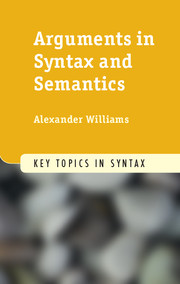4 - Arguments in Semantics
Published online by Cambridge University Press: 05 January 2015
Summary
INTRODUCTION
There is a general notion of semantic argument. It says that A is a semantic argument of B when it instantiates a term (fills a slot) in a relation expressed by B. But under this rubric fall several more specific ideas, all commonly evoked, that need to be distinguished. In this chapter I will discuss four, which I call functional arguments (Section 4.2), content arguments (Section 4.3), entailed role arguments (Section 4.4) and participant arguments (Section 4.5). In Section 4.6, I will review common ideas on the correspondence of semantic and syntactic arguments.
The need for distinction reflects actual diversity in usage. The term “argument” is used with more variety in semantics than it is in syntax, and for a reason. In syntax it is clear what sort of fact the distinction between arguments and adjuncts is meant to account for: namely, different effects on distributional category. The string carry the chair slowly has nearly the same distribution as carry the chair, but these two strings both differ substantially in distribution from carry on its own. The claim that the chair but not slowly is an argument is meant to encode this. In semantics, however, the distinction between arguments and non-arguments finds no single agreed explanandum that is equally clear. Consider (1).
(1) Mo might cook sausage in the kitchen with our blowtorch.
Its meaning relates Mo, sausage, the kitchen and our blowtorch all to an event of cooking. If any single aspect of this fact demands a purely semantic distinction between arguments and adjuncts, it is not clear at first blush. Any distinction we might care to make will therefore be based on observations that are subtle or even tendentious – nothing so plain as a difference in string distributions. And with no single kind of fact to be accountable to, usage of “semantic argument” is correspondingly diverse. Linguists feel free to use it in any of several different ways. In the interests of clarifying conversation, I will now put labels to a few of these uses.
- Type
- Chapter
- Information
- Arguments in Syntax and Semantics , pp. 77 - 93Publisher: Cambridge University PressPrint publication year: 2015



